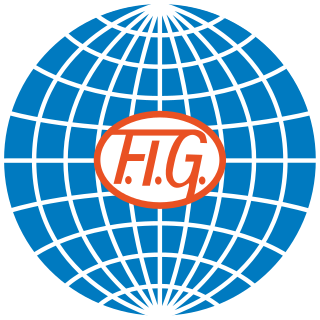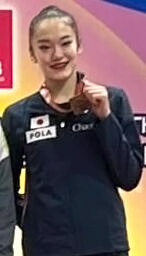
Rhythmic gymnastics is a sport in which gymnasts perform individually or in groups on a floor with an apparatus: hoop, ball, clubs, ribbon and rope. The sport combines elements of gymnastics, dance and calisthenics; gymnasts must be strong, flexible, agile, dexterous and coordinated. Rhythmic gymnastics is governed by the International Gymnastics Federation (FIG), which first recognized it as a sport in 1963. At the international level, rhythmic gymnastics is a women-only sport.

The International Gymnastics Federation is the body governing competition in all disciplines of gymnastics. Its headquarters is in Lausanne, Switzerland. It was founded on 23 July 1881 in Liège, Belgium, making it the world's oldest existing international sports organisation. Originally called the European Federation of Gymnastics, it had three member countries—Belgium, France and the Netherlands—until 1921, when non-European countries were admitted and it received its current name.
The Rhythmic Gymnastics World Championships are the world championships for the sport of rhythmic gymnastics. The tournament is promoted and organized by the Fédération Internationale de Gymnastique (FIG). It is one of the three tournaments in rhythmic gymnastics officially organized by FIG, as well as the Rhythmic Gymnastics World Cup and the gymnastics competitions at the Olympic Games. The first edition of the World Championships was held in 1963, a time when the sport was known as modern gymnastics. The current program of the World Championships contemplates both individual and group performances. In even non-Olympic years and the year before the Olympics, a team event is also contested. Two events are not competed at the World Championships anymore: individual rope and free hands.
The Rhythmic Gymnastics European Championships are the European championships for the sport of rhythmic gymnastics. They were first held in 1978. The European Championships and the European Junior Championships were united in 1993. Prior to 2006, they were called the European Rhythmic Gymnastics Championships. The competition is organised by the European Union of Gymnastics.
The Asian Gymnastic Union (AGU) organizes Asian Gymnastics Championships for each of the FIG gymnastic disciplines: men's and women's artistic gymnastics, rhythmic gymnastics, acrobatic gymnastics, aerobic gymnastics and trampoline gymnastics. This article lists only the senior editions of the Asian Gymnastics Championships, in which competitors must be over 16 years of age. Specific editions of the Asian Championships also exist for junior athletes; for example, the first edition of the Junior Asian Artistic Gymnastics Championships was held in 1971, but the first senior edition of the tournament was only held in 1996. Similarly, Junior Asian Trampoline Championships were held in 2010 and 2012, but only in 2014 the Asian Gymnastics Union held a senior tournament in conjunction with the junior championships for the first time.

Gymnastics at the 2020 Summer Olympics in Tokyo was held in three categories: artistic gymnastics, rhythmic gymnastics and trampolining. All gymnastics events were staged at the Olympic Gymnastic Centre, Tokyo in 2021.

Sumire Kita is a retired Japanese individual rhythmic gymnast. She is the 2016 Asian Junior all-around champion, the 2022 Asian Senior all-around silver medalist, two-time Japanese National Junior champion, and four-time Japanese National senior champion.
The Four Continents Gymnastics Championships refers to two distinct competitions, organized by different federations in different disciplines. In rhythmic gymnastics the tournaments were organized from 1978 to 2001 by the International Gymnastics Federation. In aesthetic group gymnastics the tournaments have been organized by the International Federation of Aesthetic Group Gymnastics since 2014. The events gather competitors from four continents: Africa, the Americas, Asia and Oceania.
Gymnastics at the 2018 Asian Games was held at the Jakarta International Expo Hall D2, Jakarta, Indonesia, from 20 to 30 August 2018.
The 2018 FIG World Cup circuit in Rhythmic Gymnastics is a series of competitions officially organized and promoted by the International Gymnastics Federation.

Anna-Marie Suzanne Quint Ondaatje also simply known as Anna-Marie Ondaatje is a Canadian born female rhythmic gymnast of Sri Lankan descent. She has competed in national level competitions in Canada and has represented both Canada and then switched to compete for Sri Lanka in international gymnastics events. She became the first rhythmic gymnast to represent Sri Lanka at the Commonwealth Games after creating history for the nation at the 2018 Commonwealth Games and was also named as one of just four female gymnasts from Sri Lanka to represent at the 2018 Commonwealth Games.
Koi Sie Yan is a Malaysian rhythmic gymnast.

The 2018 Rhythmic Gymnastics World Championships were held in Sofia, Bulgaria, from 10 to 16 September 2018 at Arena Armeec. The top three countries in the group all-around, Russia, Italy, and Bulgaria won the first three spots for the 2020 Olympic Games. Russia was the most successful nation of the competition with seven of the nine gold medals, and Bulgaria and Italy each won a title.
The 2019 FIG World Cup circuit in Rhythmic Gymnastics is a series of competitions officially organized and promoted by the International Gymnastics Federation.
The 1st Rhythmic Gymnastics Asian Cup was held in Ulaanbaatar, Mongolia from October 26 to 28, 2018. The competition had senior and junior divisions, and a team event consisting of two senior gymnasts and one junior gymnast.
The 2021 FIG World Cup circuit in Rhythmic Gymnastics is a series of competitions officially organized and promoted by the International Gymnastics Federation. The events had originally been scheduled to be held in 2020, but were postponed to 2021 due to the COVID-19 pandemic.
Alina Muratovna Adilkhanova is a Kazakhstani rhythmic gymnast. She is the 2018 Asian Games all-around and team champion. She is also the 2018 and 2021 Asian all-around champion and is an eleven-time medalist at the Asian Championships. She represented Kazakhstan at the 2020 Summer Olympics and placed twenty-first in the qualification round for the all-around.

Ekaterina Andreevna Fetisova is an Uzbekistani rhythmic gymnast. She is the 2021 Asian Championships ball champion and all-around bronze medalist. She also won team gold and hoop bronze at the 2019 Asian Championships. She represented Uzbekistan at the 2018 Summer Youth Olympics and at the 2020 Summer Olympics. She is the 2018 Asian junior all-around champion.

Kim Chae-woon is a South Korean retired individual rhythmic gymnast. She is a multiple time medalist at the Asian Rhythmic Championships and was part of the team that won the bronze medal at the 2018 Asian Games.







